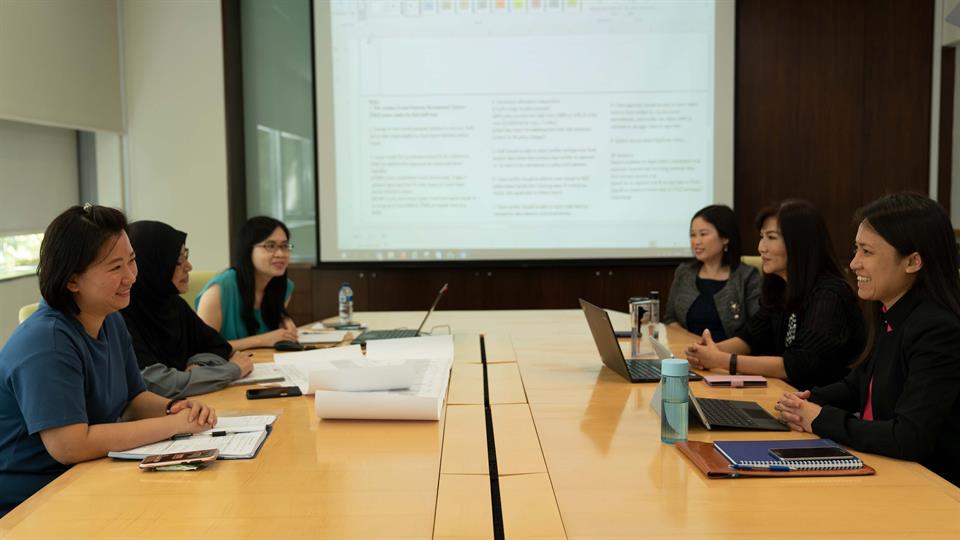The NUS Travel Requests and Claims (TRAC) System garners a high usage among University staff, especially those who travel frequently for official work.
The submission process, linked to the leave and travel request systems, means both the finance and human resource departments are involved; and navigating the process can at times be rather challenging. Thanks to an Organisational Excellence (OE) team’s review to simplify the workflow, staff can now look forward to a much more simplified and seamless work process.
The team – headed by Initiative Owner (IO) Phyllis Kum, Director of Finance, Compliance and Operations at NUS Business School and Co-IO Hong Lai Lai, Senior Manager at Office of Financial Services (OFS) – has been spending numerous hours since mid-2018 scrutinising every step of the process and coming up with ideas to enhance the workflow.
For instance, before users go on business travel, they must first key in their leave, apply for travel, then wait for approval before making a flight or hotel booking. “Because TRAC is system dependent, the travel may be delayed, which is a major concern,” Phyllis highlighted. “The immediate remedial action is to lessen these pain points by deploying ‘Quick Wins’.”
One Quick Win already in place reduces user “touch points” – number of times users enter or access the system – by promoting and increasing the use of NUS Corporate Purchasing Card and Corporate Travel Card. The receipts collected are handed to the verifier to cost-allocate the transactions, then approved by the relevant approving authority in the system. Staff thus need not use personal funds and be reimbursed, as payment is made by the University directly to the bank.
Another measure rolled out in October 2018 is the new Grab Charge, in addition to the existing Cab Charge vouchers. Instead of the pay-first claim-later mode, the procedure just requires the receipt to be submitted to the verifier, and the University is billed directly by the vendor.
Other Quick Wins include simplification of subsistence allowance calculations and air-ticket purchases.
Being tasked to lead the high-profile TRAC initiative means additional workload but Phyllis is undeterred. “By adopting a positive mindset, we are able to accomplish a lot,” she stressed.
Communication is crucial to clarify issues immediately, and constructive feedback focuses on the process, not the people. “Through open communication, we can thrash out all the differences, difficulties and roadblocks. That’s how we get the work moving,” Phyllis explained.
Lai Lai also shared that she has learnt to keep an open mind and be receptive to new ideas, such that she could critically assess hitherto “sacred cow” processes and do away with unnecessary ones.
One major change in the pipeline is the switch from hardcopy receipt to electronic copy. Separating TRAC into a standalone set-up and implementing a new platform would be another improvement process.
The target operating model is to have an end-to-end seamless and user-friendly system that will delight users, achieve cost efficiency while retaining necessary control.
“The longer term is to make the process even more seamless and pain-free by delinking the leave and travel requests, so that it’s just a claims system,” Phyllis disclosed. “This will eliminate layers of checks, verification and bureaucracy.”
Organisational Excellence is a strategic initiative undertaken by the University to develop best practices for an efficient and world-class administration to better support NUS’ Vision and Mission. It aims to bring about improved work processes and policies as well as create opportunities for talent development and growth.

The OE TRAC team (from left): Eileen Ho, Management Assistant Officer, NUS Medicine Dean’s Office; Sulastri Bte Ashari, Management Assistant Officer, OFS; Hong Lai Lai; Wendy Chan Mun Hok, Deputy Director, Lee Kuan Yew School of Public Policy; Phyllis Kum; and Lim Pei Ling, Senior Associate Director (Administration), NUS Business School (Team member Taffy Elaine Lindsey Ng, Manager, OFS is not in the photo)